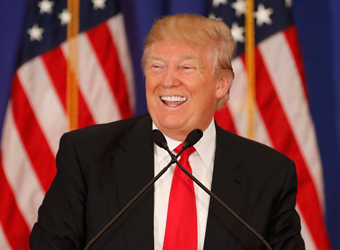U.S. President Donald Trump announced Thursday that the United States will withdraw from the landmark Paris climate agreement.
Trump also said he would start talks to re-enter the accord with what he called a more “fair” deal, but was immediately rebuked by several European governments.
The decision sets the world’s largest economy apart from almost all other nations on Earth, and moves in opposition to many large American companies, as well. Always a showman, Trump announced the decision in a heavily teased event at the White House Rose Garden, where administration officials and conservatives applauded the move.
“In order to fulfill my solemn duty to protect America and its citizens, the United States will withdraw from the Paris climate accord, but begin negotiations to re-enter either the Paris accord or an entirely new transaction on terms that are fair to the United States, its businesses, its workers, its people, its taxpayers,” Trump said.
“So we’re getting out,” Trump said, “but we will start to negotiate, and we will see if we can make a deal that’s fair. And if we can that’s great, and if we can’t that’s fine.”
The governments of Germany, Italy and France — the three largest economies in the European Union — immediately threw out that idea. They released a joint statement Thursday saying they “firmly believe” that the accord can’t be renegotiated, Reuters reported.
Trump cannot technically pull out of the agreement until November 2019, and the U.S. must give a year’s notice before it can withdraw, according to reports. So a withdrawal may not take effect until 2020, though mechanisms exist to possibly speed the process.
The White House contends that the U.S. has already reduced its carbon dioxide emissions and does not need the Paris accord to cut them even more, according to talking points obtained by CNBC.
Obama: Other countries will get the new jobs
In a statement after Trump’s announcement, his predecessor, President Barack Obama, said that the countries still in the Paris deal “will be the nations that reap the benefits in jobs and industries created.” He said he believes state governments and the private sector will still push to cut emissions — and indeed, most U.S. states are moving forward on fighting carbon pollution without Washington.
“I believe the United States of America should be at the front of the pack. But even in the absence of American leadership; even as this administration joins a small handful of nations that reject the future; I’m confident that our states, cities, and businesses will step up and do even more to lead the way, and help protect for future generations the one planet we’ve got,” Obama said.
In defending the decision to yank the U.S. out of the agreement, Trump cited a series of figures provided by a consulting firm that does work for the energy industry.
Trump said the Paris Agreement would cost the United States 2.7 million jobs by 2025 and shave trillions from the U.S. economy, citing the numbers generated by NERA Economic Consulting.
The White House also said the agreement could cost the U.S. economy “nearly $3 trillion over the next several decades,” citing the same study.
That report was prepared for the American Council for Capital Formation, a conservative think tank whose board includes prominent Republicans and representatives from industry trade groups. The report does not take into account potential benefits from emissions reductions or future technology that could influence costs over the long term.
Trump warned of “brownouts” as well, without providing any information to back that claim.
US businesses support Paris deal
CEOs of some of the largest U.S.-based companies disagree with the president and his backers. They say the Paris Agreement gives them a level playing field to compete with foreign rivals and would grow the economy and create jobs by encouraging investment in new technology.
A number of large American companies were among those advocating for staying in the Paris Agreement, including U.S. energy giants Exxon Mobil and Chevron and their European peers Royal Dutch Shell and BP. The oil majors say the accord offers a framework for tackling global warming and gives the United States a role in steering the global response to climate change.
Even some coal producers like Cloud Peak Energy and Peabody Energy argued the United States should remain a party in order to negotiate coal’s future in the global energy mix.
CEOs of companies like Apple and Microsoft, among many others, also pushed Trump to uphold the agreement.
Tesla CEO Elon Musk — a Paris deal proponent whose company also benefits from a shift to renewable energy sources — immediately carried out his threat to leave three White House advisory councils after Trump spoke in the Rose Garden.
Most of the planet on board with Paris deal
More than two decades of climate diplomacy produced the Paris Agreement in December 2015. The treaty is designed to prevent global temperatures from rising by more than 2 degrees Celsius above pre-industrial levels. The accord requires the 195 signatories — nearly every country in the world — to create national plans to reduce their greenhouse gas emissions in a bid to mitigate the effects of climate change.
Syria and Nicaragua are the only countries in the United Nations Framework Convention on Climate Change that are not signatories.
Under Obama, the United States committed to reducing its greenhouse gas emissions by between 26 and 28 percent below 2005 levels by 2025. The Obama administration also pledged $3 billion to a fund established to help developing nations meet their Paris Agreement goals, the largest donation announced to date.
Source: CNBC


